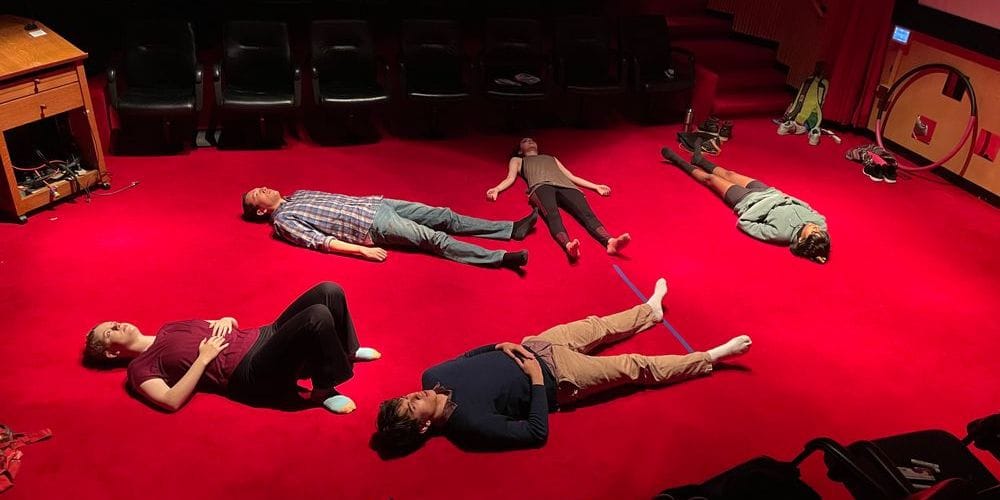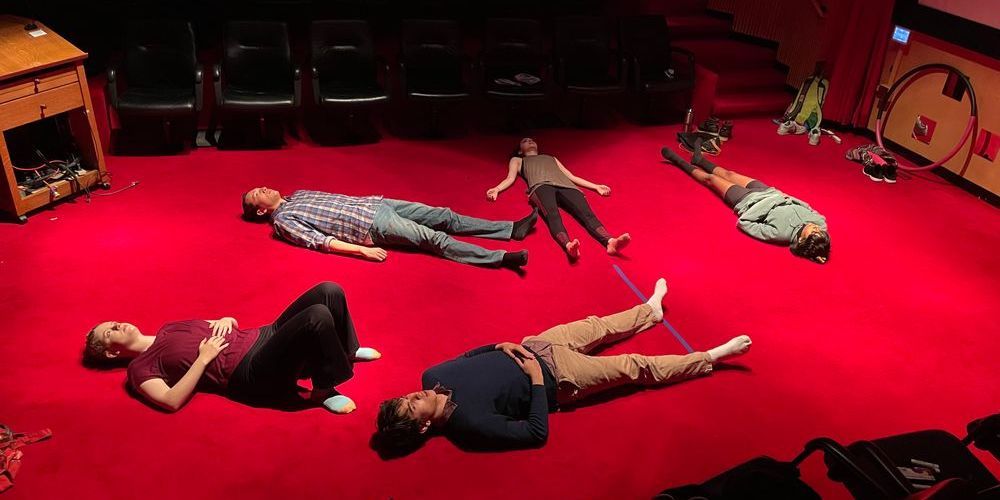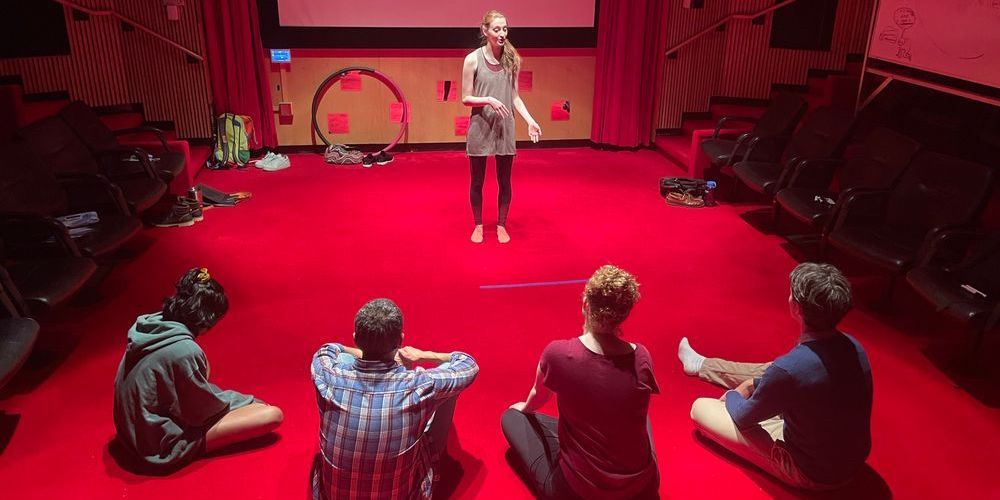"Circle Mirror Transformation": Acting About Acting
Arts & Living Editor Alex Brandfonbrener '23 reviews "Circle Mirror Transformation," which follows an adult acting class through a series of crises. He praises the show's varied performances, which show the potential for experimental, emotional and impactful student acting.


Annie Baker’s “Circle Mirror Transformation” came to life this weekend in a Green Room production, directed by Bianca Sass ’23. I attended a dress rehearsal on Thursday, Dec. 2, a day before their opening night. While the cast and crew were still polishing up a few final staging elements, the production had largely been finalized in Cole Assembly Hall. Colloquially known as “The Red Room,” the room is noteworthy for the red carpets that line the floor and stairs of the amphitheatre. In this simple but distinctive backdrop, Sass has brought the absolute most out of all the actors, staging one of the most compelling productions I have seen at Amherst.
The show presents a unique acting challenge: the cast must act as actors learning to act. The play’s setting is a creative drama class for adults at a local community center. One teacher, four students. The play throws you into their acting exercises, which Baker uses creatively to provide insight and background into the characters. For example, the play’s opening requires the five participants to count to tenn — one, two, three, four, five… — without speaking over each other. But they stumble and restart repeatedly, failing to reach ten; it is clear that the novice actors have a long way to go. And then, the scene abruptly ends. The play continues similarly, with a jarring lack of context and sharp transitions.
Equally tense is the awkward setting: it’s an acting class for adults. Long silences fall between sentences, and characters struggle with miscommunications. But the five characters still appear distinctly, and have been individually brought to life. Theresa (Petra Brusiloff ’24) is eager and competent, while Schultz (Miles Garcia ’25) struggles with stutters and socialization. The teacher Marty (Emma Ratshin ‘22E) controls the group with a patient but didactic tone, and her husband James (Max Hauschildt ’25) is quiet but lively, and at times, impatient and angry. While all five are impressively acted and sympathetic, I especially enjoyed the nervous but innocent teenager Lauren (Snigdha Ranjan ’25), who wrestles with making herself present in the group. Sporting a large sweatshirt like armor, she pops into scenes by quietly observing intimate conversations from behind, unphased. But she is also an emotional participant, and holds her own against the other, older characters. Acting as both a comic and a mournful element, she provides relief from the occasional disingenuousness of the others. And while Ranjan excels, the other four also play with rhythm of speech and bodily motion, presenting conflicting emotions that grind against each other.
It’s not just awkward, though. A delicate intimacy accompanies the interruptions, as the actors are forced to embody the emotional states of each other. One of the exercises throughout the drama class requires each actor to share the history of another, from the other’s perspective. The originally stilted Schultz grows closer to Theresa, and shares the story of her failed career as an actor in New York City, as if he was her. It reflects the fact that all five are learning about each other and becoming more comfortable with acting. Even when they say one thing, they mean another, and it is perfectly clear.
Another memorable acting exercise makes one actor assume the role of director, arranging the others to recreate a childhood scene. When Lauren takes the directorial role, she makes Marty and James her parents, who act out a domestic dispute. The scene is layered and impactful. Marty and James incorporate their own marital problems and James’s distance from his daughter. Then, when they debate how they should treat their daughter, “Lauren,” the whole discussion is really all about James. And Lauren silently listens: it is her childhood, but she also displays understanding and sympathy for Marty and James.
The show also uses its drama class premise as a force of surprise. Lauren and James reenact a freely evolving argument between Theresa and her ex. When Lauren is unable to hold her own, Theresa jumps in and takes the role of herself. For a lot of the play, she says she can’t get over her ex. Now, she is able to come to terms with her past, and say exactly how he mistreated her.
By the end of the play, the relationships between the characters have been rearranged. The five play a game where they list all the things they “would bring to India,” adding a new item each round. Schultz excitedly lists all the items, but forgets the one Theresa added. Earlier in the play, these two are as close as can be. They have had a romantic falling out, and it is clear he is not over it, at all. Baker uses the constitutive unit of the play — the acting exercises — in order to shed light on both past traumas and present tensions.
As the characters become more and more truthful in their acting, their lives fall apart outside of the exercises. Marty says that she received a black eye from “falling off of her bed”: the implication is that James has mistreated her. But the space they inhibit while acting returns as a truthful force. Each actor writes a deep, dark secret on a scrap of paper, and shares one at random. It isn’t clear who has written which secret — but we know, and they know. It’s one of the tensest moments of the show. Yet only after this exercise can the five complete their original task and successfully count to 10. By brutally exposing themselves to each other, they learn both how to act and how to be genuine.






Comments ()